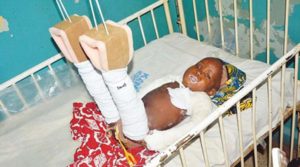Kano children’s daily encounter with abuse
This feature examines the various forms of child rights abuses in Kano state, Nigeria and the need for all stakeholders including religious and traditional leaders, civil society and media to work together to end the menace

Two weeks ago three-year old Naima Nura of Dorayi quarters in Kano metropolis had her arms broken as a result of being smashed on the ground by her stepmother. Barely a year ago, in the same Kano, 21-month old Musa Murtala was brutally beaten up and mutilated by his merciless stepmothers who ganged up against Musa severely mutilating his eyes and genitalia, leaving the toddler with broken legs and arms as well.
The bestiality visited on Baby Musa by the 2 beasts called his stepmothers was man’s inhumanity to his fellow human at it is utmost peak hence the barrage of public outcry and condemnations that trailed its aftermath!
The cases of toddlers Naima and Musa are but few known examples of the unimaginably disturbing savage treatment children go through in Kano state and across Nigeria, most of which we never know about because they neither make it to news headlines nor trend on social media. The two cases represent outstanding examples of beastliness and savagery against harmless children.
Kano, the home state of both Naima and Musa has one of the worst records of violations against children in Nigeria and it is yet to ratify and domesticate Nigeria’s Child Rights Act (CRA) of 2003 which is aimed at protecting the right of children in Nigeria and other related issues.
“Children are facing a lot of challenges, they don’t have access to education as such you find them roaming the street hawking or even doing so aimlessly. This is even as their parents are still alive yet they don’t care about their welfare so they can neither educate them nor even feed them,” says Aisha Haruna, the Kano coordinator of the National Council for Child Rights Advocates of Nigeria (NACCRAN), a foremost Nigerian non-profit working on children’s rights.
Although most cases of domestic abuse against children being reported in the media In Kano are carried out by stepmothers against their stepchildren, Haruna wondered why mothers would mercilessly assault and maim even their own biological children inflicting damages on sensitive parts of their bodies, in some cases crippling them for life – as if they were not the ones that actually gave birth to them!
“There is a particular mother who is in the habit of using fire to torture her daughter whenever she sends her hawking and there is a deficit in the total sales made by the girl. There is another mother who out of anger smashed the head of her infant child inflicting lifelong damages to his brain,” she recalls.
The failure of Kano state to pass and enforce the Child Rights Act (CRA) means infant children and adolescents in the state continue to suffer various degrees of psychological, physical and sexual abuses and neglect, on daily basis. Major acts of child abuses and violations like rape, hitting, suffocation, poisoning and burning are daily occurrences.
One of the disturbing consequences of the failure of the state to domesticate the act is the rampant cases of child and infant rape; earning it one of the worst records of rape against minors and adolescents. Cases of few months old babies being raped by men old enough to be their grandfathers are not uncommon. For example, as many as 100 cases of rape against children were reported to the police within a space of 2 just months (November-December) in 2013.
Hussaina Aliyu Ibrahim is the chairperson of the Federation of International Women Lawyers (FIDA) in Kano who argued that the Child Rights Act was meant to protect children from various degrees of abuses adding that the act was only advocating for “doing the right thing for children” urging the Kano state government to excise sections it deemed contrary to the traditions of the people state and domesticate the larger part of the law which is harmless.
“The law (Child Rights Act) is for the betterment of the nation because it advocates for doing the right thing for children; it says give the girl-child education up to junior secondary school level. It will make girls better wives and subsequently great mothers. So, what is harmful about it? What I have been saying is that the government should look critically at the act, and take out issues they think are against our traditions and domesticate it,” argues Ibrahim.
Speaking to this correspondent about the pathetic plight of children in Kano state, Yardada Maikano Bichi, the state’s commissioner for women affairs and social development claimed the state was going to domesticate the 2003 Child Rights Act very soon adding that Kano was implementing various campaigns aimed at sensitizing parents on the need to take good care of their children.
“We ensure appropriate care for children across our various social homes including the victims of child abuse like rape. We ensure those guilty of rape serve the 14 years jail sentence and sensitize parents on the need to take good care of their children; one wonders why parents particularly mothers, after all the pains they go through during pregnancy and childbirth, will allow their children to be roaming the street exposing them to all vices,” she says.
It is obvious that the government is doing very little to end the challenge of child abuse in Kano state, however, the solution to the various acts of child rights abuses in state lies to a great extent, in the ability of all stakeholders – including government, religious and traditional leaders, civil society and media – to work together to not only ensure the passage of the 2003 Child Rights Act in the state but also to ensure the successful implementation of the law.












